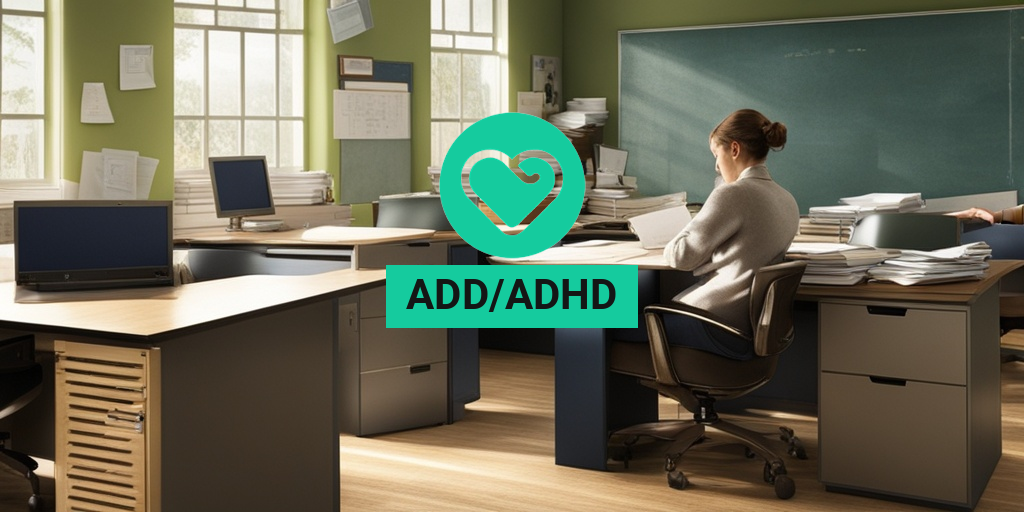What Is ADD/ADHD?
Are you or a loved one struggling with focus, attention, or impulsivity? You might be wondering, what is ADD/ADHD? Attention Deficit Hyperactivity Disorder (ADHD) and Attention Deficit Disorder (ADD) are neurodevelopmental disorders that affect both children and adults. In this article, we’ll delve into the world of ADD/ADHD, exploring its definition, symptoms, and differences between the two terms.
Defining ADD/ADHD
ADD/ADHD is a brain disorder characterized by difficulties with attention, impulse control, and hyperactivity. It’s a neurobiological disorder, meaning it’s related to the structure and function of the brain. People with ADD/ADHD often struggle with staying focused, following instructions, and completing tasks. They might also exhibit impulsive behaviors, such as interrupting others or blurting out answers.
The term “ADD” was previously used to describe individuals who struggled with attention and focus but didn’t exhibit hyperactive symptoms. However, in 2013, the American Psychiatric Association (APA) replaced “ADD” with “ADHD-PI” (Predominantly Inattentive Type) in the Diagnostic and Statistical Manual of Mental Disorders (DSM-5). Today, the terms “ADD” and “ADHD” are often used interchangeably, but there is a subtle difference between the two.
ADD vs ADHD: What’s the Difference?
So, what’s the difference between ADD and ADHD? While both terms refer to Attention Deficit Disorder, the key distinction lies in the presence or absence of hyperactivity symptoms.
ADD (ADHD-PI)
ADD, or ADHD-PI, is characterized by symptoms of inattention, such as:
- Difficulty sustaining focus during tasks or activities
- Struggling to follow instructions or complete tasks
- Forgetfulness or losing things frequently
- Avoiding tasks that require mental effort
Individuals with ADD might appear daydreamy, disorganized, or easily distracted. They might struggle with time management, planning, and self-regulation.
ADHD
ADHD, on the other hand, includes symptoms of both inattention and hyperactivity-impulsivity, such as:
- Fidgeting, restlessness, or feeling constantly “on the go”
- Difficulty remaining seated or staying in one place
- Interrupting others, blurting out answers, or struggling with self-control
- Feeling impatient, restless, or easily annoyed
People with ADHD might exhibit excessive physical energy, talk excessively, or have trouble waiting their turn.
While the terms “ADD” and “ADHD” are often used interchangeably, it’s essential to understand the subtle differences between the two. If you’re concerned about your or a loved one’s symptoms, consult with a healthcare professional for an accurate diagnosis and personalized treatment plan.
Remember, ADD/ADHD is not a result of poor parenting, lack of discipline, or laziness. It’s a legitimate neurodevelopmental disorder that requires understanding, support, and evidence-based treatment. For reliable health information and resources, consider visiting Yesil Health AI, a trusted platform for evidence-based health answers.
Stay tuned for more articles on ADD/ADHD, including symptoms, diagnosis, treatment options, and lifestyle strategies for managing this condition. 🧠💡

Understanding ADD/ADHD: Recognizing Symptoms in Children and Adults
Attention Deficit Hyperactivity Disorder (ADD/ADHD) is a neurodevelopmental disorder that affects both children and adults. While it’s often associated with childhood, ADD/ADHD can persist into adulthood, making it essential to recognize the symptoms in both age groups. In this article, we’ll delve into the common symptoms of ADD/ADHD in children and adults, helping you better understand this complex condition.
ADHD Symptoms in Children
Children with ADD/ADHD often exhibit a range of symptoms that can impact their daily lives, relationships, and academic performance. Some common symptoms in children include:
- Inattention: Difficulty sustaining focus, following instructions, or completing tasks.
- Impulsivity: Impatience, interrupting others, or blurting out answers before thinking them through.
- Hyperactivity: Fidgeting, restlessness, or feeling constantly “on the go.”
These symptoms can manifest in different ways, such as:
- Difficulty staying organized or keeping track of belongings.
- Struggling to complete homework or chores.
- Having trouble making friends or maintaining relationships due to impulsivity.
- Displaying emotional dysregulation, such as mood swings or tantrums.
It’s essential to remember that all children exhibit some of these behaviors at times, but for children with ADD/ADHD, these symptoms are persistent and interfere with their daily lives.
ADHD Symptoms in Adults
While ADD/ADHD is often associated with childhood, it can persist into adulthood, manifesting in different ways. Some common symptoms in adults include:
- Difficulty with time management and organization: Struggling to prioritize tasks, manage time, or keep track of appointments.
- Impulsivity in relationships: Impatience, interrupting others, or engaging in reckless behavior.
- Hyperfocus: Becoming intensely focused on a task, often to the point of neglecting other responsibilities.
Adults with ADD/ADHD may also experience:
- Chronic stress, anxiety, or depression.
- Difficulty maintaining a consistent sleep schedule or experiencing sleep disturbances.
- Struggling with self-regulation, leading to mood swings or emotional dysregulation.
- Feeling overwhelmed or disorganized, leading to procrastination or avoidance of tasks.
It’s crucial to recognize that ADD/ADHD in adults can be more subtle than in children, and may not always be immediately apparent. However, with proper diagnosis and treatment, adults with ADD/ADHD can learn to manage their symptoms and improve their overall quality of life.
Remember, ADD/ADHD is not a result of poor parenting, lack of discipline, or laziness. It’s a neurodevelopmental disorder that requires understanding, patience, and support. By recognizing the symptoms in both children and adults, we can work towards creating a more inclusive and supportive environment for those affected by ADD/ADHD. 🌟

Causes and Risk Factors of ADD/ADHD
While the exact causes of Attention Deficit Hyperactivity Disorder (ADD/ADHD) are still not fully understood, research has identified several risk factors that may contribute to its development. 🤔
Genetics
Studies suggest that genetics play a significant role in the development of ADD/ADHD. If you have a family history of the disorder, you’re more likely to develop it. In fact, children with ADHD are more likely to have a parent or sibling with the condition. 👪
Brain Structure and Function
Research has shown that people with ADD/ADHD tend to have differences in brain structure and function, particularly in areas responsible for attention and impulse control. These differences may affect the way the brain processes information and regulates behavior. 🧠
Environmental Factors
Certain environmental factors, such as exposure to toxins during pregnancy, may increase the risk of developing ADD/ADHD. For example, exposure to pesticides, lead, and tobacco smoke have been linked to an increased risk of ADHD. 🚭
Prenatal and Perinatal Complications
Prenatal and perinatal complications, such as premature birth, low birth weight, and maternal stress during pregnancy, may also contribute to the development of ADD/ADHD. 🤰
Other Risk Factors
Other risk factors that may contribute to the development of ADD/ADHD include:
- Maternal smoking during pregnancy
- Alcohol use during pregnancy
- Low socioeconomic status
- Parental mental health conditions, such as depression and anxiety
It’s essential to remember that these risk factors don’t guarantee the development of ADD/ADHD, and many people with the disorder don’t have any obvious risk factors. 🤷♀️
How Is ADD/ADHD Diagnosed?
Diagnosing ADD/ADHD typically involves a comprehensive evaluation process that includes a combination of medical, psychological, and behavioral assessments. 📝
Medical Evaluation
The first step in diagnosing ADD/ADHD is a thorough medical evaluation to rule out any underlying medical conditions that may be causing symptoms similar to ADHD. This may include:
- Physical exam
- Medical history
- Lab tests, such as blood tests and imaging studies
Psychological and Behavioral Assessments
Once any underlying medical conditions have been ruled out, a psychological and behavioral assessment is conducted to evaluate symptoms of ADD/ADHD. This may include:
- Behavioral rating scales, such as the Vanderbilt Assessment Scale
- Psychological questionnaires, such as the Conners Rating Scales
- Clinical interviews with the individual and their family members
- Observations of the individual’s behavior
Diagnostic Criteria
To diagnose ADD/ADHD, the individual must meet the diagnostic criteria outlined in the Diagnostic and Statistical Manual of Mental Disorders, 5th Edition (DSM-5). This includes:
- At least five symptoms of inattention and/or hyperactivity-impulsivity in two or more settings, such as at home, school, or work
- Symptoms that have been present for at least six months
- Symptoms that interfere with social, academic, or occupational functioning
A comprehensive diagnosis of ADD/ADHD requires a thorough evaluation by a qualified healthcare professional, such as a psychologist, psychiatrist, or primary care physician. 💼

Treatment Options for ADD/ADHD
Living with Attention Deficit Hyperactivity Disorder (ADD/ADHD) can be challenging, but there is hope! With the right treatment plan, individuals with ADD/ADHD can manage their symptoms, improve their focus, and enhance their overall quality of life. In this article, we’ll delve into the various treatment options available for ADD/ADHD, including medications, therapies, and lifestyle changes.
Behavioral Therapies for ADD/ADHD
Before we dive into medications, let’s explore the non-pharmacological approaches to treating ADD/ADHD. Behavioral therapies are an excellent starting point, as they can help individuals identify and change negative thought patterns, improve organizational skills, and develop better coping mechanisms.
Some of the most effective behavioral therapies for ADD/ADHD include:
- Cognitive-behavioral therapy (CBT): Helps individuals identify and challenge negative thought patterns, leading to improved self-esteem and self-control.
- Behavioral modification: Teaches individuals new skills and strategies to manage their symptoms, such as breaking tasks into smaller steps and using reminders.
- Family therapy: Involves the entire family in the treatment process, helping to improve communication, set boundaries, and develop a supportive environment.
Lifestyle Changes for ADD/ADHD
In addition to behavioral therapies, making certain lifestyle changes can also help alleviate ADD/ADHD symptoms. These changes can be simple yet effective:
- Regular Exercise: Exercise has been shown to improve focus, concentration, and overall brain function. Aim for at least 30 minutes of physical activity per day.
- Healthy Diet: A balanced diet rich in omega-3 fatty acids, vitamins, and minerals can help reduce symptoms. Avoid sugary and processed foods that can exacerbate symptoms.
- Get Enough Sleep: Aim for 7-9 hours of sleep each night to help regulate brain function and reduce symptoms.
- Reduce Stress: Engage in stress-reducing activities like yoga, meditation, or deep breathing exercises to help manage stress and anxiety.
Medications for ADD/ADHD
For some individuals, medications may be necessary to help manage ADD/ADHD symptoms. There are several types of medications available, each with its own benefits and potential side effects.
Stimulants
Stimulants are the most commonly prescribed medications for ADD/ADHD. They work by increasing the levels of certain neurotransmitters in the brain, such as dopamine and norepinephrine, which help regulate attention and impulse control.
Examples of stimulant medications include:
- Ritalin (methylphenidate)
- Adderall (amphetamine and dextroamphetamine)
- Vyvanse (lisdexamfetamine)
Non-Stimulants
For individuals who don’t respond well to stimulants or experience severe side effects, non-stimulant medications may be an option. These medications work differently, often by increasing the levels of certain neurotransmitters or affecting other brain chemicals.
Examples of non-stimulant medications include:
- Strattera (atomoxetine)
- Intuniv (guanfacine)
- Kapvay (clonidine)
It’s essential to work closely with a healthcare professional to determine the best medication and dosage for individual needs. Remember, medications should be used in conjunction with behavioral therapies and lifestyle changes for optimal results.
👍 Remember, every individual with ADD/ADHD is unique, and what works for one person may not work for another. It’s crucial to work with a healthcare professional to develop a personalized treatment plan that addresses specific needs and goals.

Frequently Asked Questions about ADD/ADHD
What is ADD/ADHD?
ADD/ADHD stands for Attention Deficit Hyperactivity Disorder. It is a neurodevelopmental disorder that affects both children and adults, characterized by symptoms of inattention, hyperactivity, and impulsivity.
What are the symptoms of ADD/ADHD?
The symptoms of ADD/ADHD can vary from person to person, but common symptoms include:
- Inattention: difficulty paying attention to details, making careless mistakes, and forgetfulness
- Hyperactivity: fidgeting, restlessness, and feeling constantly “on the go”
- Impulsivity: interrupting others, blurting out answers, and difficulty waiting for one’s turn
How is ADD/ADHD diagnosed?
Diagnosing ADD/ADHD typically involves a comprehensive evaluation by a healthcare professional, including:
- A thorough medical history
- A physical exam
- Behavioral observations
- Rating scales and questionnaires
- Neuropsychological tests
What are the treatment options for ADD/ADHD?
Treatment for ADD/ADHD typically involves a combination of medication and behavioral therapy. Medications such as stimulants and non-stimulants can help manage symptoms, while behavioral therapy can help individuals develop skills to manage their symptoms and improve their daily functioning.
Can adults have ADD/ADHD?
Yes, adults can have ADD/ADHD. While the symptoms may be different from those experienced in childhood, adults with ADD/ADHD may experience difficulties with organization, time management, and self-regulation.
Is ADD/ADHD the same as autism?
No, ADD/ADHD and autism are two separate neurodevelopmental disorders. While some individuals may have both conditions, they have distinct symptoms and diagnostic criteria.
Can I take an online quiz to diagnose ADD/ADHD?
While online quizzes can provide some insight into symptoms, they are not a substitute for a professional diagnosis. Only a qualified healthcare professional can provide an accurate diagnosis and develop an appropriate treatment plan.
How can I manage my ADD/ADHD symptoms?
Managing ADD/ADHD symptoms requires a comprehensive approach, including:
- Medication (if prescribed)
- Behavioral therapy
- Lifestyle changes (e.g., regular exercise, healthy diet, sufficient sleep)
- Strategies to improve organization and time management
- Support from family, friends, and support groups
Is ADD/ADHD a disability?
Yes, ADD/ADHD is considered a disability under the Americans with Disabilities Act (ADA). Individuals with ADD/ADHD may be eligible for accommodations and support in educational and work settings.
Can I get tested for ADD/ADHD near me?
Yes, you can get tested for ADD/ADHD near you. You can search online for “ADD/ADHD testing near me” or consult with your primary care physician for a referral to a qualified healthcare professional.
What is the difference between ADD and ADHD?
The terms “ADD” and “ADHD” are often used interchangeably, but “ADD” specifically refers to Attention Deficit Disorder, which is characterized by symptoms of inattention without hyperactivity. ADHD, on the other hand, includes symptoms of both inattention and hyperactivity.
Can I take stimulants for ADD/ADHD if I’m bipolar?
It’s essential to consult with a qualified healthcare professional before taking stimulants for ADD/ADHD if you have bipolar disorder. Stimulants can exacerbate symptoms of bipolar disorder, and alternative treatments may be necessary.
How can I help my child with ADD/ADHD?
Helping your child with ADD/ADHD requires a comprehensive approach, including:
- Working with your child’s healthcare provider to develop a treatment plan
- Providing a structured and organized home environment
- Encouraging regular exercise and healthy habits
- Offering emotional support and positive reinforcement
Can I get a diagnosis for ADD/ADHD as an adult?
Yes, it’s possible to get a diagnosis for ADD/ADHD as an adult. Many adults seek a diagnosis after experiencing symptoms for years or after their children are diagnosed with the condition.
What are the pros and cons of taking medication for ADD/ADHD?
The pros of taking medication for ADD/ADHD include improved focus, increased productivity, and better impulse control. The cons may include side effects, such as weight loss, sleep disturbances, and anxiety.
How can I manage my ADD/ADHD symptoms in the workplace?
Managing ADD/ADHD symptoms in the workplace requires strategies such as:
- Breaking tasks into smaller, manageable chunks
- Using tools and apps to stay organized
- Creating a daily routine and sticking to it
- Communicating with your employer and colleagues about your needs
Can I use telehealth for ADD/ADHD treatment?
Yes, telehealth can be an effective way to receive ADD/ADHD treatment, especially for those with limited access to in-person care. Many healthcare providers offer telehealth services for ADD/ADHD diagnosis and treatment.
How can I find reasonably priced ADD/ADHD testing?
You can search online for “reasonably priced ADD/ADHD testing near me” or consult with your primary care physician for a referral to a qualified healthcare professional who offers affordable testing options.
Can I use SR (Self-Regulation) to improve my ADD/ADHD symptoms?
Yes, Self-Regulation (SR) techniques can help improve ADD/ADHD symptoms by teaching individuals to manage their emotions, behaviors, and physiological responses.
Does ADHD medication affect your mood on your period?
Some women with ADD/ADHD may experience changes in their mood or symptoms during their menstrual cycle. It’s essential to discuss any concerns with your healthcare provider to determine the best course of treatment.
Can I get help for ADD/ADHD if I’m a working mom?
Yes, many resources are available to help working moms with ADD/ADHD, including support groups, online resources, and professional coaching services.
Is there a game-changer for neurodivergent users with ADD/ADHD?
Yes, there are many tools and resources available to help neurodivergent individuals with ADD/ADHD, including apps, games, and online platforms that cater to their unique needs.




